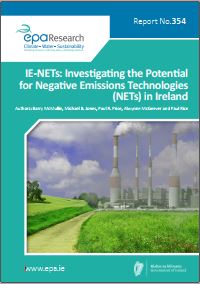Authors: Bernadette O’Regan, Richard Moles, Rosemary Byrne and Anne Bennett
Summary: The need to involve voluntary communities at local level in the implementation of successful sustainable development programmes to achieve reductions in greenhouse gas (GHG) emissions is widely recognised. This research identified 36 Irish communities that were, or were actively planning to be, involved in local-scale action to enhance sustainability. Six of the 36 were selected for this research project.

The transition to a carbon-neutral future is challenging, and how this will be achieved is not yet clear. To date, Ireland has failed to meet European Union (EU) targets for reducing carbon emissions. This points to a pressing need for Ireland to adopt additional approaches to decarbonisation. This research identified 36 Irish communities that were, or were actively planning to be, involved in local-scale action to enhance sustainability. These communities shared the attribute of being functional, that is, being organised in such a way as to be capable of taking action. Among others, the areas of recycling, transport, food growing and energy were targeted by the actions identified. The communities varied in location, size, ambitions and goals, legal status and ability to access project funding. Six were selected for this research. Some worked in collaboration with local authorities. One significant challenge faced by these communities was finding up-to-date and accessible information on relevant legal and financial barriers to expanding their size and activity. Another problem faced by all was that, as at 2019, no dedicated legislative support or national-scale government entity was available to encourage their activity. Thus, their potential role in contributing to meeting national targets was not being fulfilled.
Based on findings of this research, new policy is needed to allow the formation and operation of many more such communities, so that the success and prominence reached in some EU states can be achieved. The findings identified factors that motivate champions and community members to dedicate their time and effort to action; these are significantly different from factors that motivate individual citizens to change behaviour. The success of the Tidy Towns competition suggests that many communities are capable of organising themselves to take concrete action. However, it is clear from this research that, without additional support, existing sustainability-focused communities may fail and nascent communities will be unable to develop. Our Sustainable Future: A Framework for Sustainable Development for Ireland highlights the need to develop strategies to enhance sustainability. This study indicates that funding community-based actions will be a cost-efficient and effective means of aiding the process of decarbonisation.
This research identified and explained the significance of a wide range of measures aimed at removing existing barriers to community-based action. A website providing information on legal and financial matters was created (sustainablecommunities.ie). It is freely available, uses language accessible to non-specialists and is currently (2020) hosted by the University of Limerick. Research outcomes strongly support the creation and continual funding of an organisation dedicated to the support and recognition of sustainability-focused communities that would bridge the current gap between central government policy and the needs of community activists. A further crucial step will be collating and disseminating information on actions that have proved successful and less successful. Current community-scale funding is available through SEI for energy-related actions, but
the communities studies are engaged in a much wider range of activities, all of which have the effect of reducing greenhouse gas emissions. Membership of active and functional communities confers other benefits, such as greater social contact and the availability of meaningful leisure time activities. Social enterprise plays a role that could be expanded, creating jobs. This research points to the need for greater government support for the initial establishment of such enterprises.